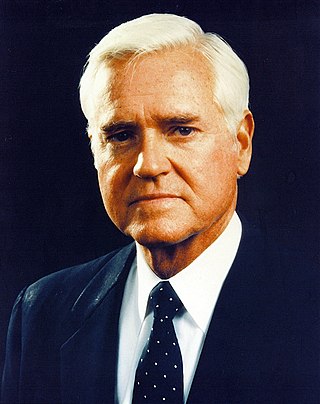
Ernest Frederick "Fritz" Hollings was an American politician who served as a United States senator from South Carolina from 1966 to 2005. A conservative Democrat, he was also the 106th governor of South Carolina, the 77th lieutenant governor of South Carolina, and a member of the South Carolina House of Representatives. He served alongside Democrat-turned-Republican Senator Strom Thurmond for 36 years, making them the longest-serving duo in U.S. Senate history. At the time of his death, he was the oldest living former U.S. senator.

The 1998 United States Senate elections were held on November 3, with the 34 seats of Class 3 contested in regular elections. This was seen as an even contest between the Republican Party and Democratic Party. While the Democrats had to defend more seats up for election, Republican attacks on the morality of President Bill Clinton failed to connect with voters and anticipated Republican gains did not materialize. The Republicans picked up open seats in Ohio and Kentucky and narrowly defeated Democratic incumbent Carol Moseley Braun, but these were cancelled out by the Democrats' gain of an open seat in Indiana and defeats of Republican Senators Al D'Amato and Lauch Faircloth. The balance of the Senate remained unchanged at 55–45 in favor of the Republicans.

The 1986 United States Senate elections were elections for the United States Senate. Held on November 4, in the middle of Ronald Reagan's second presidential term, the 34 seats of Class 3 were contested in regular elections. The Republicans had to defend an unusually large number of freshman Senate incumbents who had been elected on President Ronald Reagan's coattails in 1980. Democrats won a net of eight seats, defeating seven freshman incumbents, picking up two Republican-held open seats, and regaining control of the Senate for the first time since January 1981. This remains the most recent midterm election cycle in which the sitting president's party suffered net losses while still flipping a Senate seat.

The 1974 United States Senate elections were held on November 5, with the 34 seats of Class 3 contested in regular elections. They occurred in the wake of the Watergate scandal, Richard M. Nixon's resignation from the presidency, and Gerald Ford's subsequent pardon of Nixon. Economic issues, specifically inflation and stagnation, were also a factor that contributed to Republican losses. As an immediate result of the November 1974 elections, Democrats made a net gain of three seats from the Republicans, as they defeated Republican incumbents in Colorado and Kentucky and picked up open seats in Florida and Vermont, while Republicans won the open seat in Nevada. Following the elections, at the beginning of the 94th U.S. Congress, the Democratic caucus controlled 60 seats, and the Republican caucus controlled 38 seats.

The 1968 United States Senate elections were elections for the United States Senate. Held on November 5, the 34 seats of Class 3 were contested in regular elections. They coincided with the presidential election of the same year. The Republicans picked up five net seats in the Senate. This saw Republicans win a Senate seat in Florida for the first time since Reconstruction.

The 1966 United States Senate elections were elections on November 8, 1966, for the United States Senate which occurred midway through the second term of President Lyndon B. Johnson. The 33 seats of Class 2 were contested in regular elections. Special elections were also held to fill vacancies. With divisions in the Democratic base over the Vietnam War, and with the traditional mid-term advantage of the party not holding the presidency, the Republicans took three Democratic seats, thereby breaking Democrats' 2/3rds supermajority. Despite Republican gains, the balance remained overwhelmingly in favor of the Democrats, who retained a 64–36 majority. Democrats were further reduced to 63–37, following the death of Robert F. Kennedy in June 1968.

The 1962 United States Senate elections was an election for the United States Senate. Held on November 6, the 34 seats of Class 3 were contested in regular elections. Special elections were also held to fill vacancies. They occurred in the middle of President John F. Kennedy's term. His Democratic Party made a net gain of four seats from the Republicans, increasing their control of the Senate to 68–32. However, this was reduced to 67–33 between the election and the next Congress, as on November 18, 1962, Democrat Dennis Chávez, who was not up for election that year, died. He was replaced on November 30, 1962, by Republican appointee Edwin L. Mechem. Additionally, Democrat Strom Thurmond became a Republican in 1964, further reducing Democrats to 66–34. This was the first time since 1932 that Democrats gained seats in this class of Senators.
Gwenyfred Bush, better known as Gwen Bush, is an American politician from South Carolina, a member of the Republican Party. She was born in Chamberlain, South Dakota.

The 1966 South Carolina United States Senate special election was held on November 8, 1966 to select the U.S. Senator from the state of South Carolina. The election resulted from the death of Senator Olin D. Johnston in 1965. Then Governor Donald S. Russell entered in a prearranged agreement with Lieutenant Governor Robert Evander McNair in which Russell would resign his post so that he could be appointed Senator. However, former Governor Fritz Hollings won the Democratic primary election and went on to beat Republican state senator Marshall Parker in the general election to win his right to fill the remaining two years of the unexpired term.

The 1998 United States Senate election in South Carolina was held November 3, 1998. Incumbent Senator Fritz Hollings won reelection to his seventh term. As of 2024, this is the last time that a Democrat has won a U.S. Senate election in South Carolina. This is also the last time the Democratic nominee for this Senate seat was a white man, as in future elections Democrats would either nominate a woman and/or a person of color.
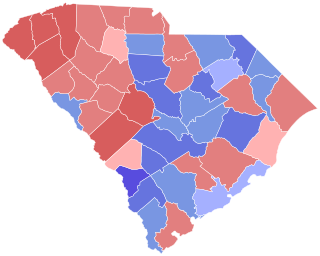
The 2004 United States Senate election in South Carolina was held on November 2, 2004. Longtime incumbent Democratic U.S. Senator Fritz Hollings retired, and Republican U.S. Representative Jim DeMint won the open seat. DeMint was the first Republican to hold this Senate seat since 1879, and the first Republican to ever be popularly elected to the seat.
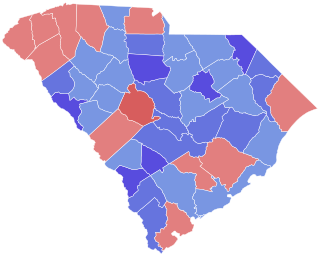
The 1992 United States Senate election in South Carolina was held on November 3, 1992. Incumbent Democratic U.S. Senator Fritz Hollings won reelection to his sixth term. Apart from Hollings's first election to the Senate in 1966, this was the closest election of Hollings's Senate career. This is the last time that a Senate candidate was voted for and was elected to the United States Senate in South Carolina at the same time that a presidential candidate of a different political party was voted for in South Carolina and had won South Carolina.
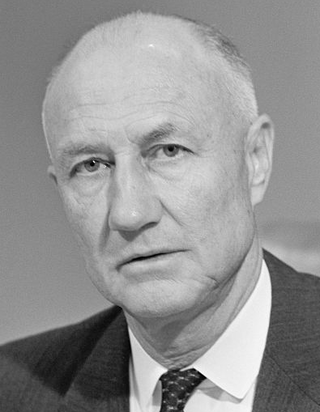
The 1966 South Carolina United States Senate election was held on November 8, 1966 to select the U.S. Senator from the state of South Carolina simultaneously with the special election to fill out the remainder of Olin D. Johnston's term.
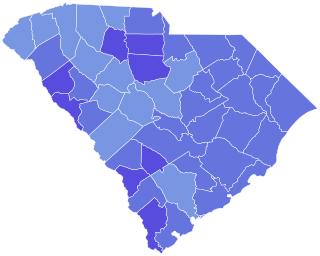
The 1968 South Carolina United States Senate election was held on November 5, 1968, to select the U.S. Senator from the state of South Carolina. Incumbent Democratic Senator Fritz Hollings easily defeated Republican state senator Marshall Parker in a rematch of the election two years earlier to win his second,, term.

The 1986 South Carolina United States Senate election was held on November 4, 1986 to select the U.S. Senator from the state of South Carolina. Popular incumbent Democratic Senator Fritz Hollings easily defeated Republican challenger Henry McMaster to win his fifth term. This is also the last US Senate election in South Carolina where the Democrat won with a double-digit margin. McMaster would much later be elected Governor in 2018.

The 1962 South Carolina United States Senate election was held on November 6, 1962 to select the U.S. Senator from the state of South Carolina. Incumbent Democratic Senator Olin D. Johnston defeated Governor Fritz Hollings in the Democratic primary and Republican W. D. Workman, Jr. in the general election.

The 1978 South Carolina United States Senate election was held on November 7, 1978, to select the U.S. senator from the state of South Carolina. Popular incumbent Republican Senator Strom Thurmond defeated Democratic challenger Charles D. Ravenel.

The 1980 South Carolina United States Senate election was held on November 4, 1980 to select the U.S. Senator from the state of South Carolina. Incumbent Democratic Senator Fritz Hollings easily defeated Republican challenger Marshall Mays to win his fourth term.

The 2000 United States elections were held on November 7, 2000. Republican Governor George W. Bush of Texas defeated Democratic Vice President Al Gore of Tennessee in the presidential election. Republicans retained control of both houses of Congress, giving the party unified control of Congress and the presidency for the first time since the 1954 elections.

The 1988 United States presidential election in South Carolina took place on November 8, 1988. All 50 states and the District of Columbia, were part of the 1988 United States presidential election. South Carolina voters chose eight electors to the Electoral College, which selected the president and vice president.






















